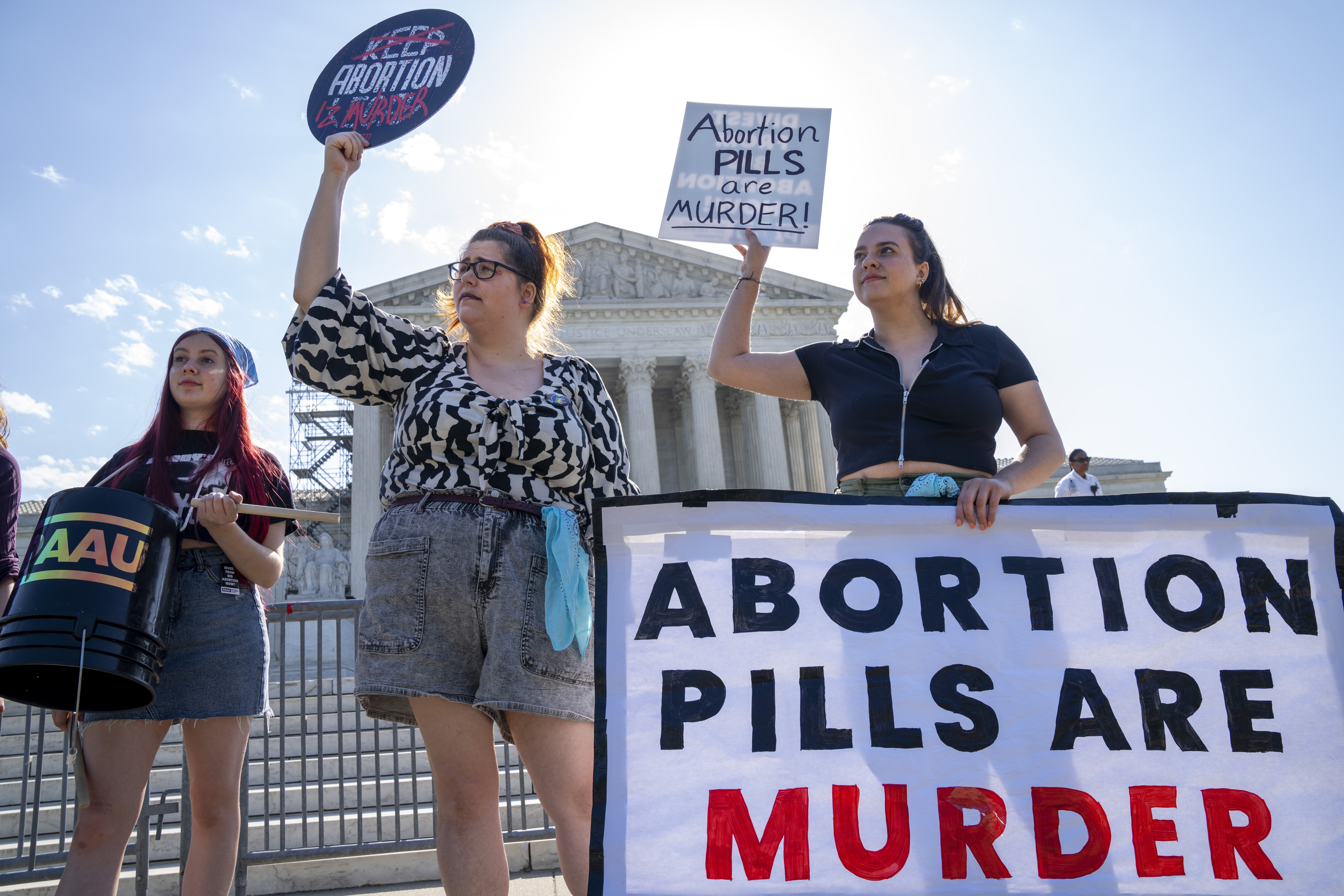Opinion | The Political Dead-End Abortion Foes Should Avoid
It might seem like a contradiction for those who oppose abortion, but it’s the only way to avoid a disastrous political dead-end.


Soon, women in states that have placed restrictions on abortion may find it easy to just order abortion pills by mail. And a Supreme Court ruling a few months ago allowing the abortion drug mifepristone to remain legal and on the market for the foreseeable future means a national ban is unlikely.
These developments are a political gift to Republicans. They should take it that way and refrain from pushing for new restrictions on medication abortions.
For Republicans who oppose abortion, this might seem like a contradiction: If abortion is bad, then shouldn’t we push to restrict the use of abortion pills? But doing that will steer Republicans straight into a political dead-end that could backfire spectacularly. Here’s why.
In 2017, when many of the current abortion trigger laws were starting to take shape in conservative states across the country, medication abortions accounted for only 39 percent of abortions. The vast majority of abortions were done in a clinic by a physician. Today, just a few years later, the majority of abortions in the U.S. are self-induced through medication and facilitated at home. For a myriad of reasons, including the rapid rise of telemedicine during the pandemic and the ability to receive medication through the mail, the proportion of abortions induced through medication continues to rise rapidly.
This presents a conundrum for anti-abortion advocates. For the past five decades, the anti-abortion movement’s strategy has been dependent on a scapegoat: Planned Parenthood. Politically, this has allowed anti-abortion messaging to focus on prosecuting what’s depicted as a predatory system of abortion providers while painting women as victims of it. While working to overturn Roe, the anti-abortion coalition worked state-by-state to chip away access to in-person abortion. That’s why we see so many states with onerous laws requiring 72-hour waiting periods and multiple in-person clinic visits before an abortion procedure can be performed. The punishment for performing a procedure usually targets providers, often referred to pejoratively as “abortionists,” who can face felony charges, prison time and loss of their medical license. Women seeking abortions are portrayed as innocent, lost, in crisis and easy targets of pro-abortion institutions.
But that strategy has become much less effective now that abortion medication, which can be taken privately at home, is the primary way to terminate a pregnancy. The problem facing abortion opponents is three-fold: Abortion pills can be discretely mailed; the “provider” is easy to conceal and almost impossible to prosecute; and in some states a woman can be subject to punishment for self-inducing her own abortion.
To deal with and downplay this dilemma, anti-abortion groups are trying to turn CVS and Walgreens into the bad guys. A group of attorneys general from states that restrict abortion has sent warning letters to pharmacies saying that mailing abortion pills is illegal and to be on notice that states will “[U]se every tool at our disposal to uphold the law if broken.”
But what happens if I call my friend in California and ask her to mail me medication? Who gets punished if I consult one of the many websites that assist women in obtaining abortion pills? Is the attorney general in Missouri going to bring charges against one civilian in California? That would be a gross misuse of government resources, not to mention legally questionable, particularly since many blue states have passed shield laws that protect providers. Perhaps the police in anti-abortion states will step in to stop an illegal underground drug ring. For Republicans’ sake, I sure hope not. The juxtaposition of using taxpayer money to raid women’s health care while the country faces a raging opioid and fentanyl crisis does not exactly scream “tough on crime.” Nevertheless, Marjorie Dannenfelser, the president of Susan B. Anthony Pro-Life America, insists that, “Everyone who is trafficking these [abortion] pills should be in jail for trafficking.”
And who is everyone? Is it the boyfriend who Googles “abortion pill?” Is it the roommate who picks up the box from the mailroom? Is it the woman who puts the pill in her own mouth? The entity on the other side of abortion bans is no longer a multi-million dollar system; these are people. They’re our neighbors, our daughters, our friends.
The question of whether women can be prosecuted for ending a pregnancy is going to be become increasingly unavoidable. The availability of mifepristone forces Republicans to answer a deeply uncomfortable question: Who is the criminal when a woman induces her own abortion? That’s a logical next step if the provider or prescriber is almost impossible to find and prosecute.
Anti-abortion groups have always known that prosecuting women is politically untenable. While it’s always been a hard sell that the same people who talk about the violence of abortion would also fight to protect a woman who terminates her pregnancy, the national anti-abortion movement has nevertheless repeatedly stated that women are off-limits.
“We state unequivocally that we do not support any measure seeking to criminalize or punish women and we stand firmly opposed to include such penalties in legislation,” a consortium of anti-abortion organizations, including the United States Conference of Catholic Bishops, wrote in an open letter last May.
As someone who has worked in the press offices of three Republican members of Congress and written hundreds of press releases, anytime I see words like “unequivocally” my ears perk up. That’s a red line. Words like that are used sparingly and purposefully in public statements: They mean business.
“Women are victims of abortion and require our compassion and support…” the letter continues. “Criminalizing women is antithetical to [the right-to-life cause].”
Even a year ago, the idea that a woman would be sent to prison over abortion care would have been brushed off as sensationalist. But today, protections for women against punishment are threatened, and the establishment anti-abortion groups are stumbling in their efforts to shield them against a growing movement from the absolutist wing of the anti-abortion coalition that is calling for the prosecution of women who terminate a pregnancy. The abortion pill inevitably forces everyone to show their hands.
This is a very real and present issue in my home state of Missouri, where lawyers and legal scholars have argued that a bizarre loophole in the current law allows women to be punished for self-inducing abortions. Newspaper columnists have raised concerns and local newspapers have begun to ask 2024 candidates for attorney general whether they believe the office has the jurisdiction to prosecute. So far, Democratic contenders say “yes” while Republican candidates have refused to respond to reporters. That’s exactly the side-by-side Republicans want to avoid. Even the perception of waffling on this issue spells catastrophe for Republicans in 2024.
Absent revocation of FDA approval — which is a stretch at best — the anti-abortion movement is left with an extremely unappealing option: Outlaw abortion medication state-by-state, just like they have started to do in Wyoming. But this would mean long, drawn-out, high-profile battles over abortion. It would mean giving legislators like state Sen. Mike Moon in Missouri, who beheaded a chicken on YouTube when talking about protecting life, a platform to espouse radical anti-abortion agendas in the 2024 legislative session. It would mean giving floor time to Republican legislators who believe women should get the death penalty for terminating pregnancies.
Coalitions of abortion opponents should stop these legal side shows seeking to pull the pills from the market. The mere production of abortion pills exposes a massive flaw in the anti-abortion playbook. State legislatures should focus instead on the people’s business, like passing education reform and creating competitive tax environments. And state attorneys general would be wise to not overplay their hands as anti-abortion activists. Many attorneys general have aspirations for higher office and they should know a political ad saying, “Don’t forget — this is the guy who thought it was okay to use taxpayer money to subpoena your period tracking app” will not age well.
Republicans should not open Pandora’s box over abortion pills. The availability of abortion medications is something anti-abortion groups will have to live with, or else they risk the unpalatable option of criminalizing women, and sparking an unsurvivable political backlash.












